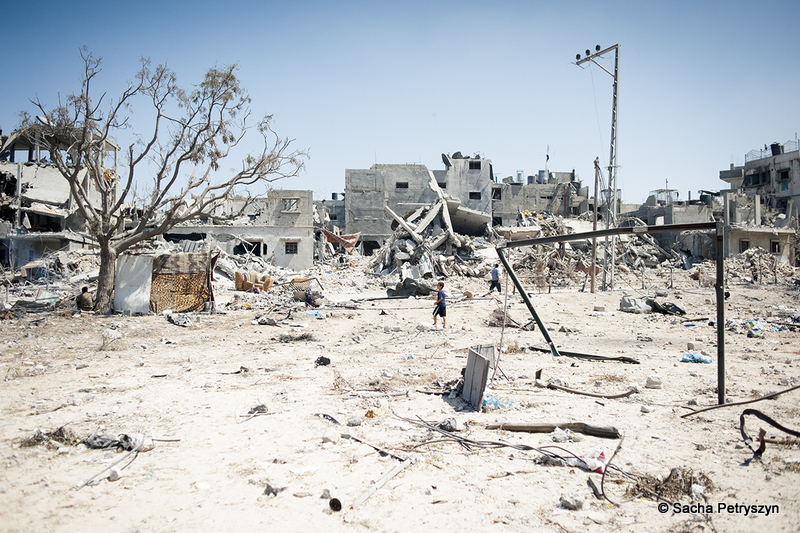Gaza: let’s not rebuild a prison

5.4 billion dollars! This was the historic amount pledged by the donor countries at the Cairo Conference of 12 October. It’s a major gesture of solidarity that we all welcome. But for the humanitarian organizations present on the ground, it’s difficult to shake off a feeling of déjà vu. The hospitals, schools, infrastructure which we helped rebuild in Gaza first in 2009, then in 2012, are once again in ruins. We’ve been here before. We’ve seen all these images of desolation before. We’ve sounded the alert in the past, just as we do today. Let’s not rebuild a prison.
In 2009, Médecins du Monde contributed to the repair of 25 of the 27 health centres damaged during Operation Cast Lead. 20 of these 25 centres were partially or totally destroyed this summer, and MdM is now preparing to repair them. During the 51 days of Israeli bombardment this summer, Médecins sans Frontières surgical teams kept working in the Al Shifa hospital, in close collaboration with the Palestinian ministry for health in Gaza. Handicap International is providing care to thousands of wounded in an attempt to prevent these people from developing permanent disabilities. Première Urgence – Aide Médicale Internationale continues to give support to small farmers – but 75% of the equipment delivered between 2012 and 2013 was destroyed in the recent aggressions. As in the aftermath of earlier offensives, the partners of CCFD – Terre Solidaire will be developing play and study areas for children and adolescents more and more traumatized by the conflict. Many of these young people have never left Gaza. 22 of the 37 kindergartens operated as part of the nutrition programme of Secours Islamique de France were damaged, and 2 entirely destroyed, but due to the blockade the difficulties in getting construction materials into Gaza make their rebuilding almost impossible.
The immediate needs are enormous, as acknowledged by the size of the financial response from the international community. It’s worth reminding here that over the last 7 years the international community has spent huge sums of money in Gaza, and yet no significant progress has been made. As the United Nations Secretary General, Ban Ki-Moon, underlined: “Going back to the status quo is not an option; this is the moment for transformational change.” But to implement this change, the donor countries, including France, must link the provision of aid (which is more urgent and necessary than ever) to the observance of a certain number of guiding principles. Respect for these principles is a necessary condition for this aid to be effective and to reduce Gaza’s dependence on external aid on the long term.
Obviously, the Palestinians themselves are the key players in reconstruction. As an immediate measure, rapid and unimpeded access to Gaza must be granted for all Palestinian professionals (healthcare personnel, psychologists, engineers etc.) from the West Bank, including East Jerusalem. The blockade put in place by Israel has cut off the Gaza Strip from the West Bank, and Gaza cannot be rebuilt in isolation. Economic, human and academic ties between Gaza and the West Bank have become practically impossible, and this situation has been going on for years. There is an urgent need to open secure crossings between Gaza and Israel and Egypt, in order to encourage the mobilization of local resources and stimulate the Palestinian economy.
Moreover the international response must be in accordance with International Humanitarian Law (IHL), the respect of which must be ensured by Third States. These states, and Francetoo, therefore, must make sure that Israel (as the occupying power) and Egypt (as a bordering country) do not hinder the reconstruction efforts. They must also make sure their assistance does not help to perpetuate an illegal situation. It is the responsibility of the international community to put an end to the blockade. It has to implement alternative solutions should major obstacles to reconstruction once again be observed. Otherwise, just like after Cast Lead in 2009 and Pillar of Defence in 2012, most reconstruction projects will come to nothing due to border restrictions. This summer, 88,000 dwellings in Gaza were destroyed or damaged. At the current rate of entry of construction materials, it will take 18 years to import the necessary materials for their reconstruction. Between 2010 and 2014, only 1,810 dwellings were rebuilt: that’s just 2% of the current requirements in Gaza.
And if reconstruction is to be sustainable, it must go hand in hand with the affirmation of a principle of accountability, and it has to engage the responsibility of those who caused the destruction. Laurent Fabius has expressed similar views: “It is impossible to ignore the growing difficulty in securing international funding for a reconstruction which, in the past, resulted in a destruction – reconstruction to which the authors of the destruction are not even called to make a financial contribution.” The international community must associate its reconstruction programme with a timeline and indicators which enable it to evaluate the progress made in terms of the easing of restrictions on the movement of persons and essential goods as a first step towards the total lifting of the blockade.
The reconstruction effort must be accompanied by clear political measures. Humanitarian organizations can give aid and care, but only the international community can put in place the conditions necessary for a lasting improvement of the situation in the Gaza Strip and contribute in this way to restoring the dignity and hope of the Palestinian people.
Thierry Brigaud, president, Médecins du Monde
Thierry Mauricet, managing director, Première Urgence – Aide Médicale Internationale
Florence Daunis, director of operations, Handicap International Fédération
Bernard PINAUD, secretary general, CCFD – Terre Solidaire
Meguerditch Terzian, president, Médecins sans Frontières France
Rachid-Lahlou, founder and president, Secours Islamique France